Why you should see an otolaryngologist if you’re still having trouble breathing after recovering from COVID-19.
If you were critically ill with COVID-19, you may have required respiratory support, such as the use of a breathing tube and ventilator. Although a breathing tube can be lifesaving, sometimes people develop scarring as a result of intubation. This scarring can cause difficulty with breathing during recovery once someone no longer needs respiratory support.
“Often people will be home from the hospital and working to recover when they feel like their breathing just isn’t getting better,” explained Alexander Gelbard, M.D., an otolaryngologist with Vanderbilt Center for Complex Airway Reconstruction. “Only after a physician examines the airway do patients realize that there was a physical obstruction limiting the movement of air into their lungs.”
Understanding airway injuries post-COVID
Breathing tubes are often used to rescue people who have lung injuries from COVID-19, or other issues, and who cannot breathe on their own. But a tube can create a scar between the vocal cords that keeps them from opening, or it can cause a scar on the windpipe itself.
When we breathe, air must go past the vocal cords and down the windpipe. Scarring in these areas can block the passage of air. “So even after your lungs recover,” Gelbard said, “you’re still left feeling like you’re short of breath. And that’s because you can’t physically move air into your lungs as well.”
“We’re taking care of a lot tracheal narrowing — what we call tracheal stenosis. This happens in the windpipe where the breathing tube rested for several days to keep patients alive,” added Christopher Wootten, M.D., another otolaryngologist with the center. “For certain patients, the tube and its inflatable balloon cuff can injure the airway. The body tries to heal this injury with scar. It is this scar that closes the airway and makes breathing difficult.”
Repairing airway injuries
If scarring in the airway framework is a cause of your post-COVID breathing troubles, then reconstruction can help. “At our Center for Complex Airway Reconstruction,” Gelbard said, “there are a number of different procedures and techniques we have to improve movement of the vocal cords when they’re scarred closed and to reconstitute caliber of the trachea if it’s blocked by scar.”
Determining the cause of post-COVID breathing challenges
Some people who didn’t need respiratory support to recover from COVID-19 may also develop issues with their voice box or trachea. However, Gelbard explained, the patients who are typically experiencing scarring are those who required a breathing tube for a length of time. But anyone who is having continued breathing issues after recovering from the virus should see an otolaryngologist, Gelbard said.
“It’s an important thing for providers and families to sort out,” Wootten explained. “How much of the breathing difficulty since a COVID infection is due to the windpipe and the voice box — the conduit to get air in and out of the lungs — or is it the lungs themselves?”
In some cases, post-COVID breathing issues could be from chronic lung injury due to the inflammatory pneumonia the virus causes. “We can check how good their lungs are at diffusing oxygen and carbon dioxide across the little fine membranes of the alveoli,” Wootten said.
If the breathing challenges are from lung injury, a patient may need to work with a pulmonologist to optimize lung function. But if the airway framework is scarred, then airway reconstruction may be the next step.
“It’s not as though COVID-19 has created unique issues,” Gelbard added. “COVID has magnified existing problems on a more massive scale than we ever thought possible.”


Vanderbilt Health’s specialists in the Complex Airway Reconstruction Program have the expertise to accurately evaluate, diagnose and treat a wide array of complex airway disorders. Our comprehensive team works with you to develop a personalized care plan, so you can swallow, speak and breathe with ease. Call 615-343-0540 for more information.

